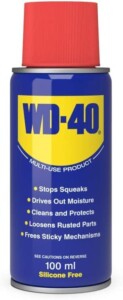Even for those of us with little more of a passing interest in DIY and engineering, WD-40 must be one of the most recognised brands in the world, famous for its multi-purpose spray, which to date has more than 2,000 documented uses.
WD-40 was in the news this month (July 2022) when it was said that it could be used to ‘hide an illicit affair’ on account of its ability to remove lipstick from collars.
Stuart Price takes a look at WD-40 and the company’s successful protection of its valuable trade secret – the WD-40 formula.
The back story to WD-40
The product was first developed in 1953 in San Diego, California, by the Rocket Chemical Company (now the WD-40 Company) and its staff of three, to create a water displacing solution for use in the aerospace industry. It is called WD-40, as the staff working on the formula, got it right on the 40th attempt. Some literal thinking in play there! Since then, the product has gone on to be sold in large volumes throughout the world.

What is interesting about the WD-40 product, however, is that it was never protected by a patent. To have patented it, the formula would have to have been published, and then the entire world would know what it contained. Yes, the patent will have protected the product for up to 20 years, but then anyone would be able to manufacture it.
Instead, since 1953, the company has relied upon keeping the formula a closely guarded trade secret. According to the WD-40 company website, only one person knows the exact formula and it is said to be written, in pencil, on the same spiral bound notebook used by the scientists noted it down back in 1953. Unsurprisingly, that notebook is now kept safely under lock and key and held deep within a San Diego bank vault.
Unlike a patent, a trade secret is not limited in time. It is only limited by the period the owner is able to keep it secret, hence the steps the owners of WD-40 and other companies such as Coca-Cola go to protect their recipes and formulae.
Why are we talking about WD-40 now?
This story is quite topical as the WD-40 Company’s CEO, Garry Ridge is set to retire as the company’s top executive on 31st August 2022.
Whilst Ridge himself has said that he could never disclose the secret to anyone and, after 25 years with the company, his loyalty to the brand cannot be questioned, could this be said of others who are custodians of trade secrets, and what should a business do to protect itself from competitors with large chequebooks, hell bent on discovering the truth?
In the UK, for something to qualify as a trade secret it must:
- Be secret;
- Have a commercial value; and
- Have been subject to reasonable steps, by the person in control of it, to keep it secret.
If something falls under the trade secret definitions, companies should think about adopting some of the following strategies to protect the secret:
- Identify the secret or secrets held by the company and keep details of these in a central register so there is no doubt what information the company asserts amounts to trade secrets;
- Establish a trade secrets policy and ensure that all employees have access to and sign to say that they have read and will comply with the terms of the policy;
- Ensure that all contracts with employees, contractors and freelancers, and suppliers, contain obligations akin to the trade secrets policy;
- Give some thought to including a liquidated damages clause in any contract that could trigger a significant payment obligation for breach; and
- Require departing employees to return copies of all documents that contain any aspect of a document that contains some or all of the elements of the secret.
What should you do if somebody uses your trade secret?
But what is to be done to the organisation that then uses the trade secret, as they are unlikely to have any contractual relationship with the owner of the secret?
The remedy for the owner of the secret is to make an immediate application to the court to restrain the use of the trade secret by way of injunction. This injunction will only be granted if the secret qualifies as a trade secret (see above) and the trade secret has been acquired unlawfully, is being used unlawfully, or its unlawful use is imminent.
A failure to act quickly may lead the court to refuse the injunction, particularly on an emergency basis, with significant implications for the party whose secret is being used.
What is best, a patent or a trade secret?
So, what of WD-40’s approach in relying upon the law of trade secrets as opposed to a patent? In many cases, it is a commercial decision to make, as there are pros and cons with either approach.
Had WD-40 applied for a patent in 1953, it would have long since expired given the time the product has been available and fallen into public domain for all-comers to produce their own version. This is not necessarily as bad as it first sounds as a sensible company would have had 20 years to build and solidify its market share, and to become the go-to product.
However, it does not mean to say that competitors would not undercut and inflict financial damage over time. But, for the period whilst under patent protection, if a competitor used the formula then they would no doubt have been met with swift retaliatory action in the courts for injunctive relief for patent infringement.
Trade secrets need a robust strategy
As it is, WD-40 has been able to keep the formula secret now for almost 70 years with a robust strategy. There are other well-known example of this: Coca-Cola has done likewise with its recipe for more than 130 years. KFC has protected its secret recipe since the 1940’s (that recipe is also said to be handwritten and held in a bank vault, with eleven vials containing the herbs and spices).
For any company looking to protect its intellectual property (it does not just have to be a recipe or chemical formula) it is vital to take advice either from a solicitor or patent attorney before any disclosures are made.
This helps to make sure that all options remain available for discussion to determine the best option for the company and its future plans.
Contact usContact us
Need more advice?
For help with a legal problem or more information on any of our services at Lodders, please get in touch with our friendly team. You can contact us via the number or email address below, or fill in the form and we will get back to you as quickly as we can.

Contact a member of the team
Read more
Other news, insights and events







